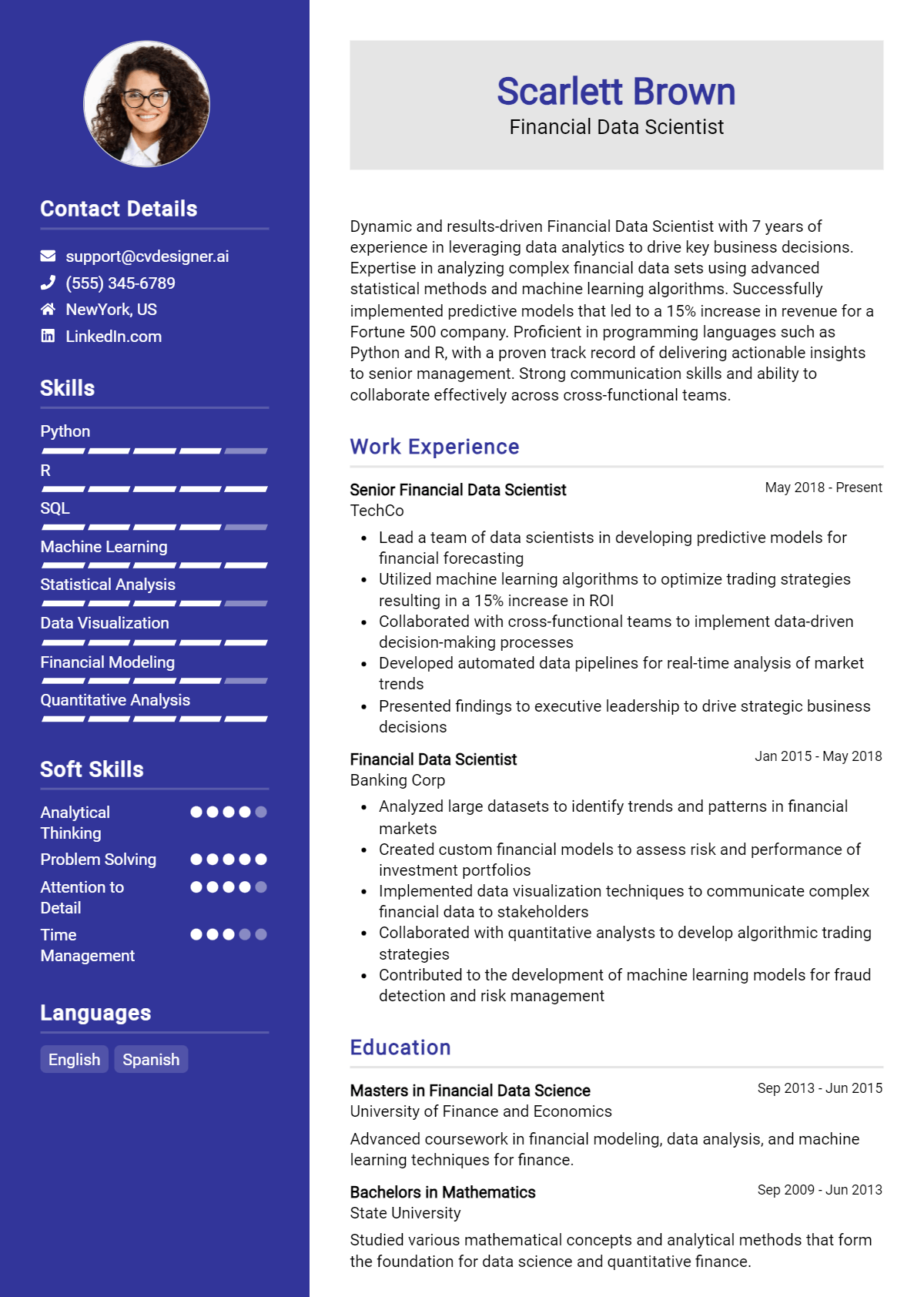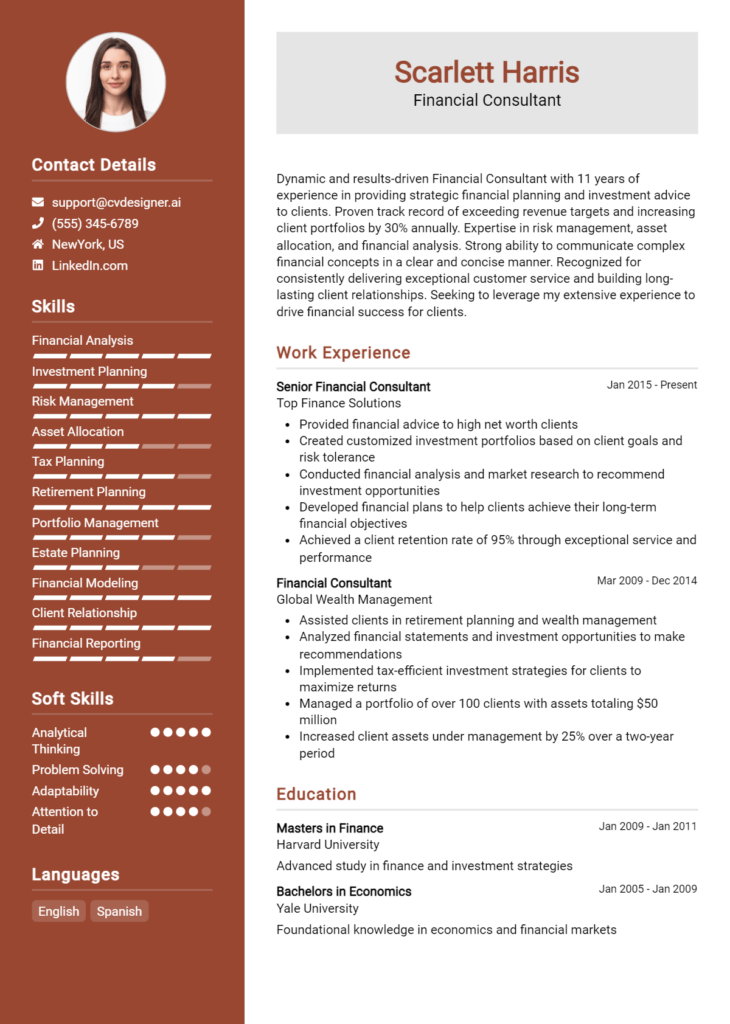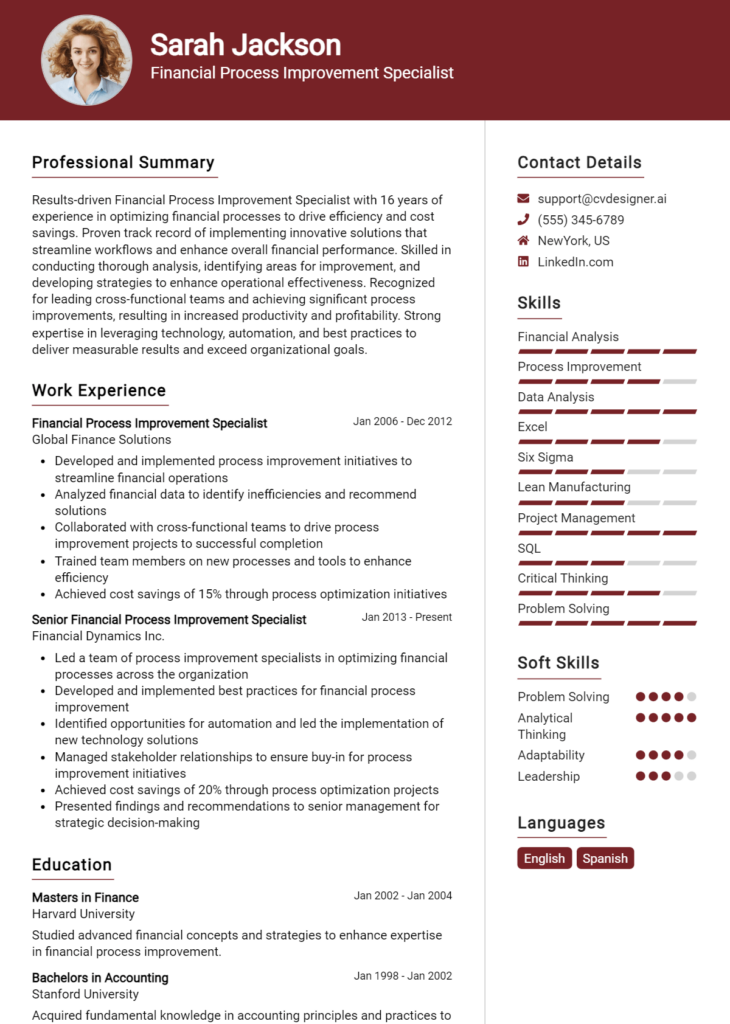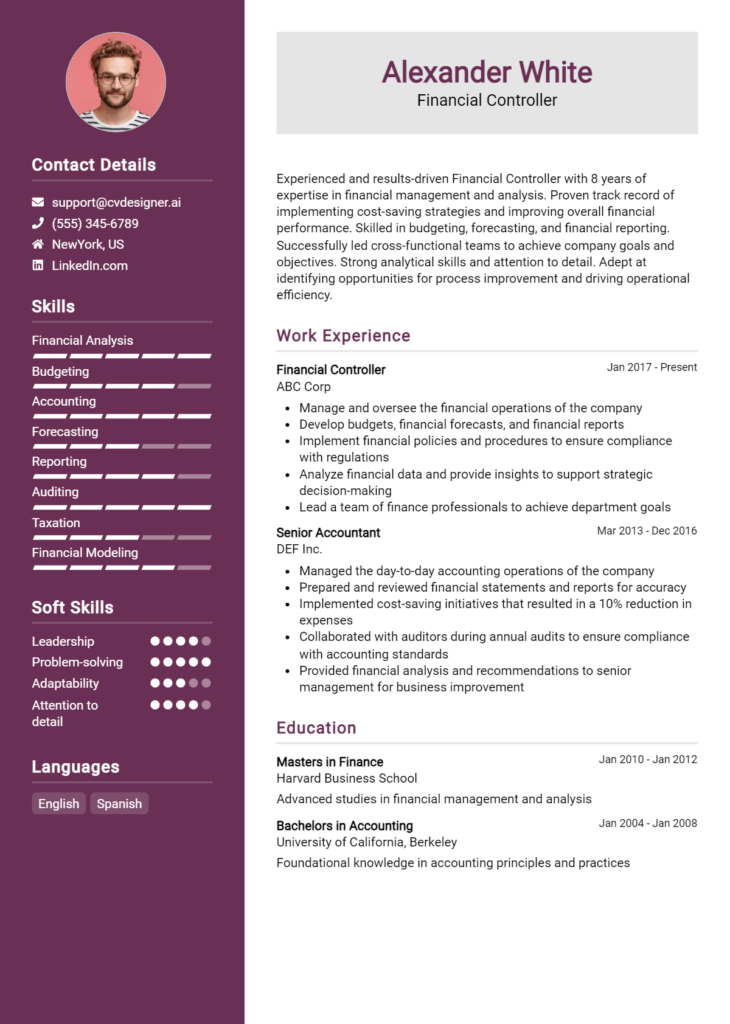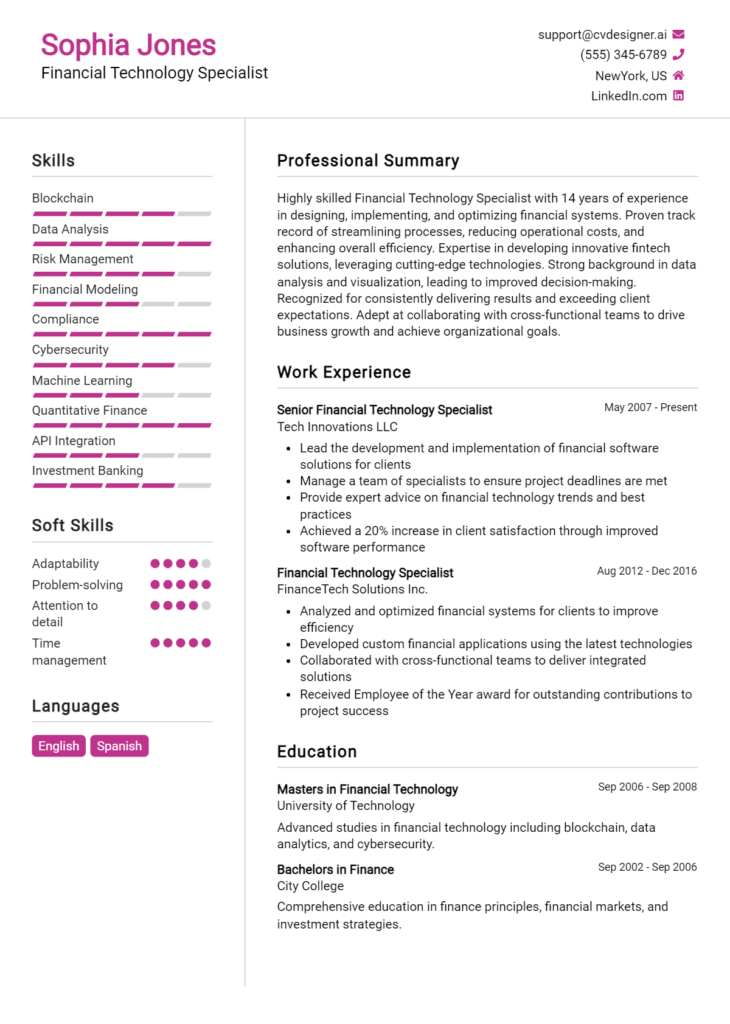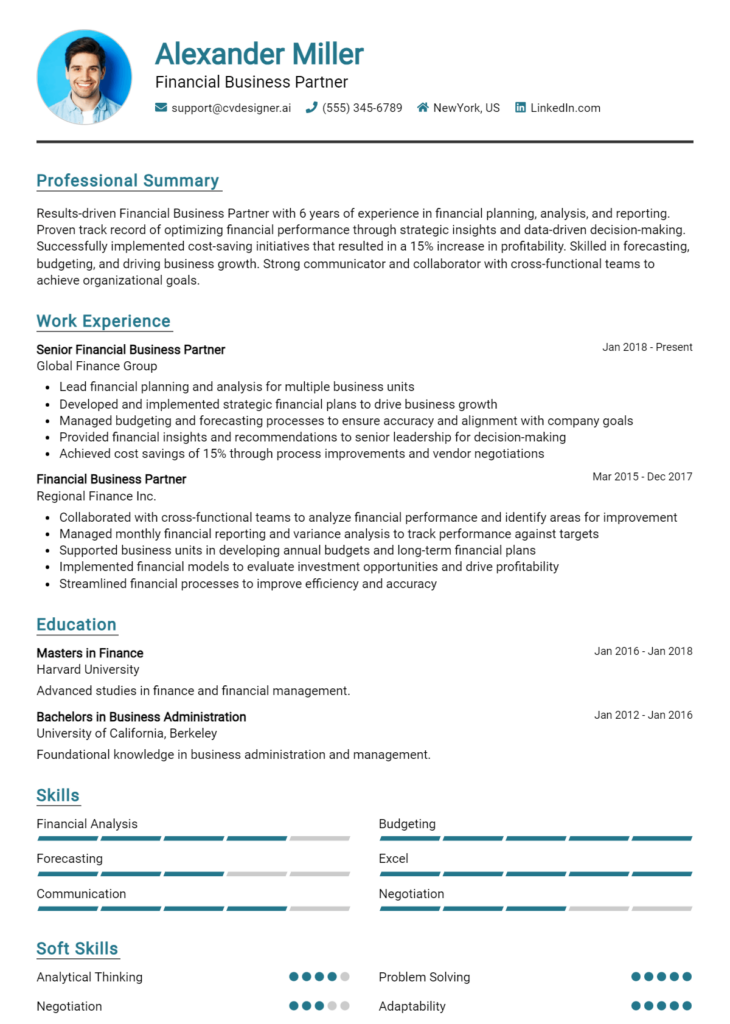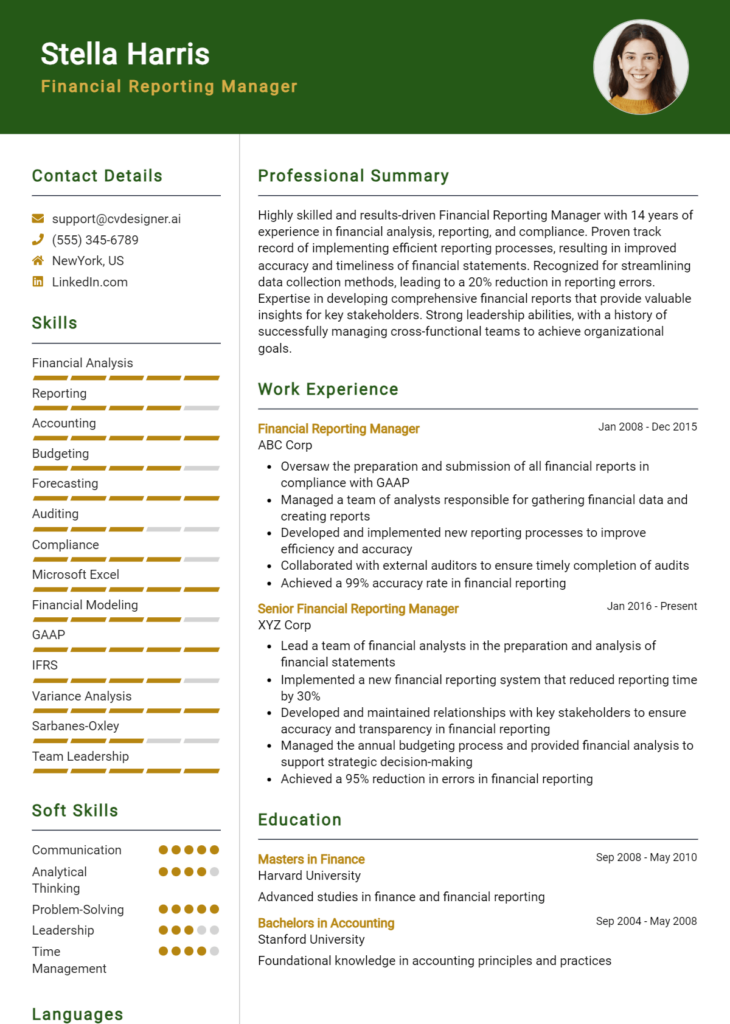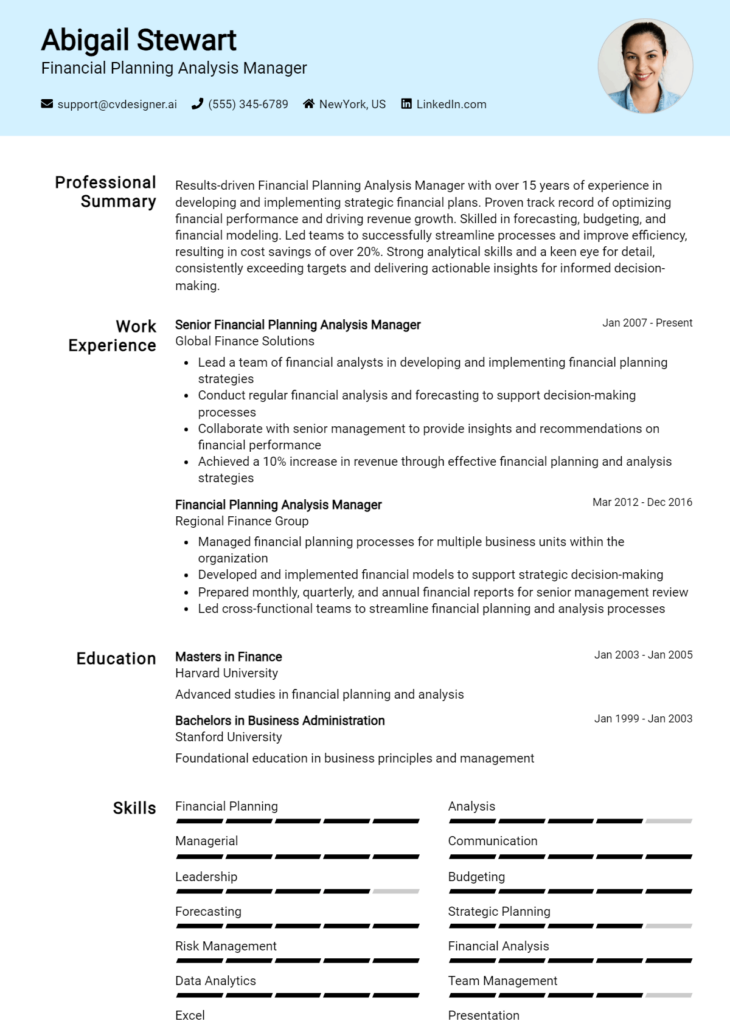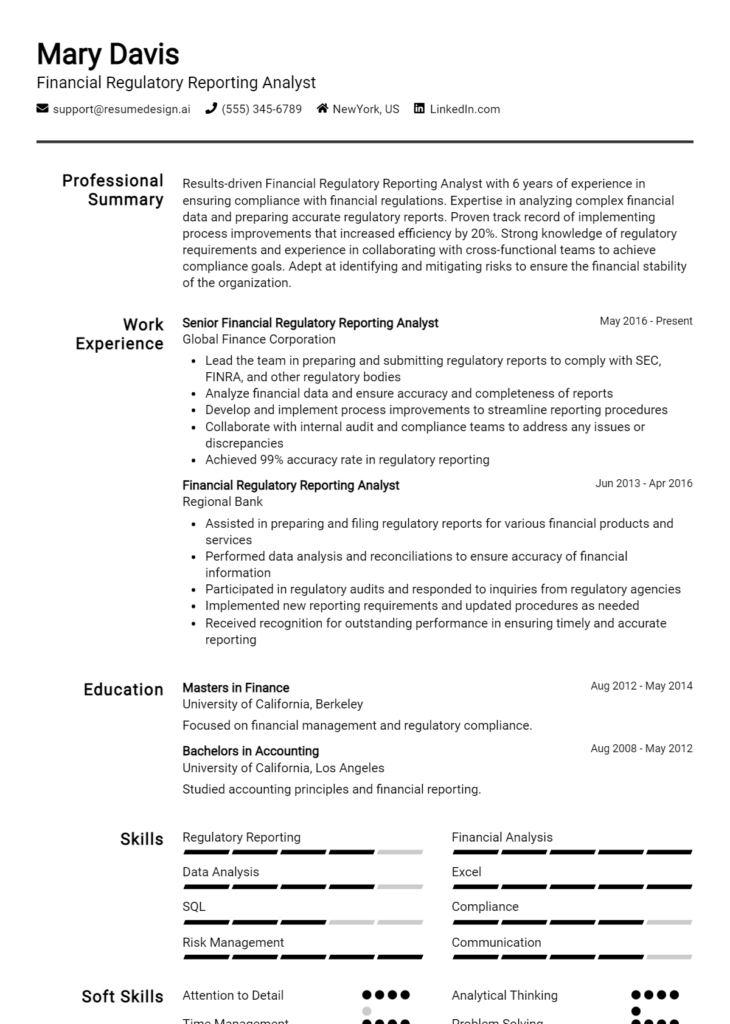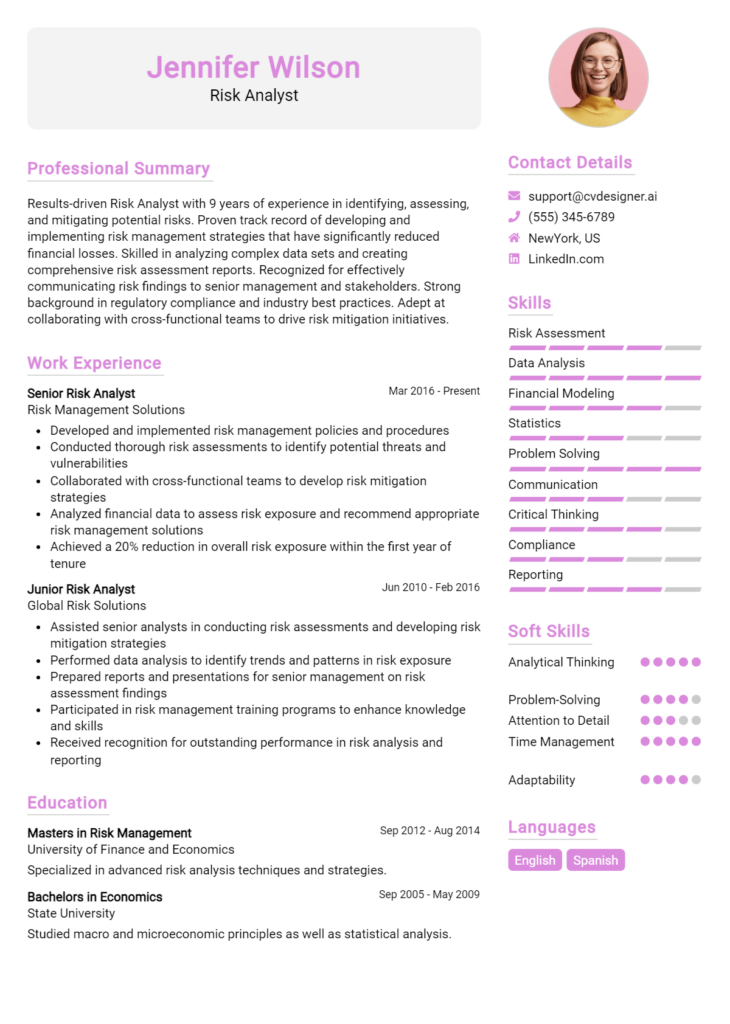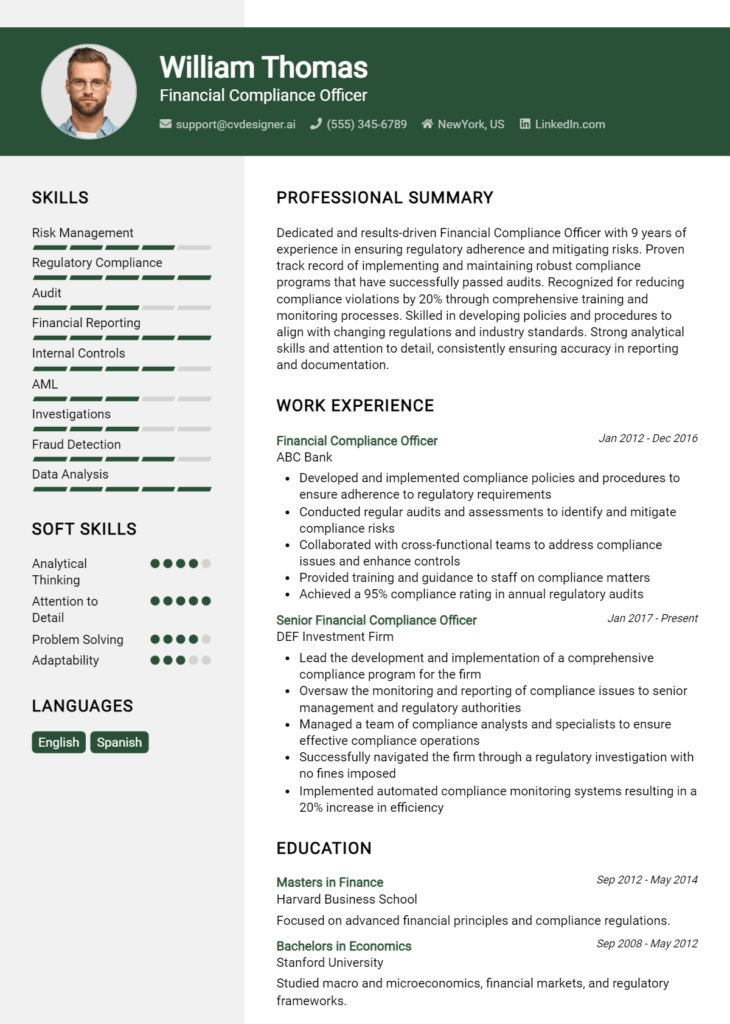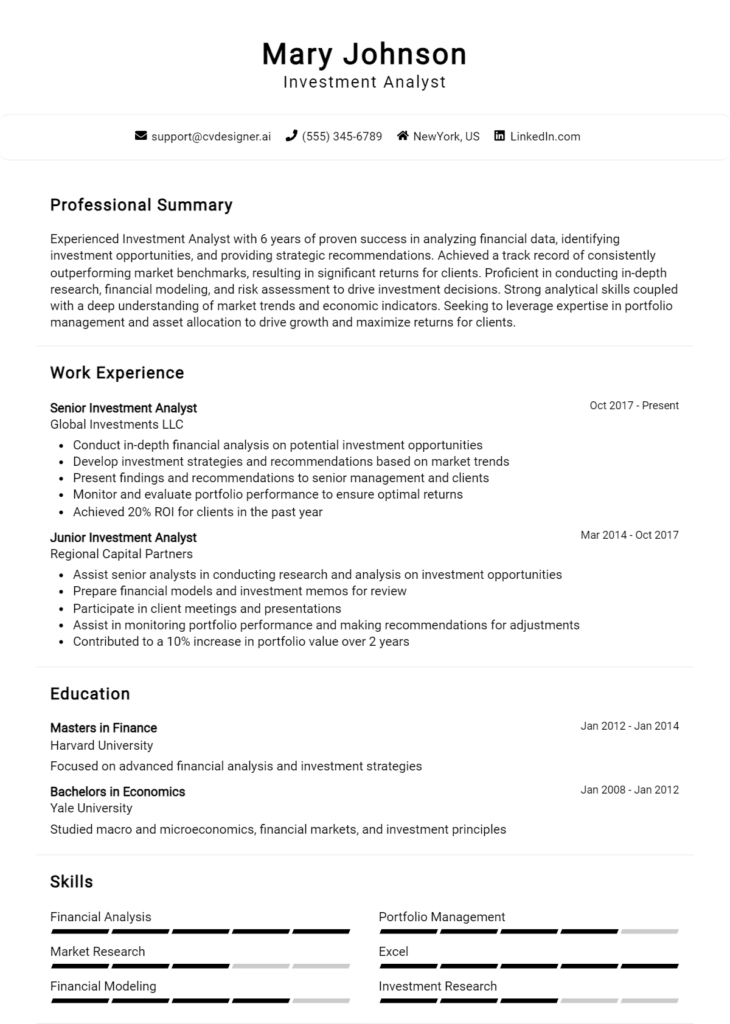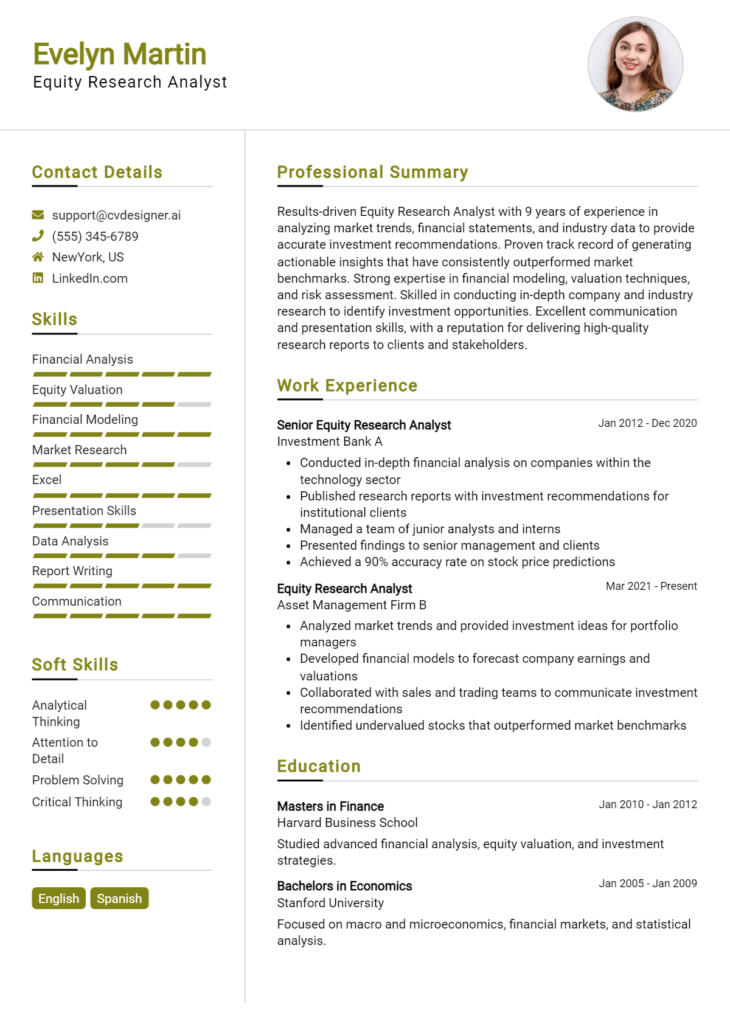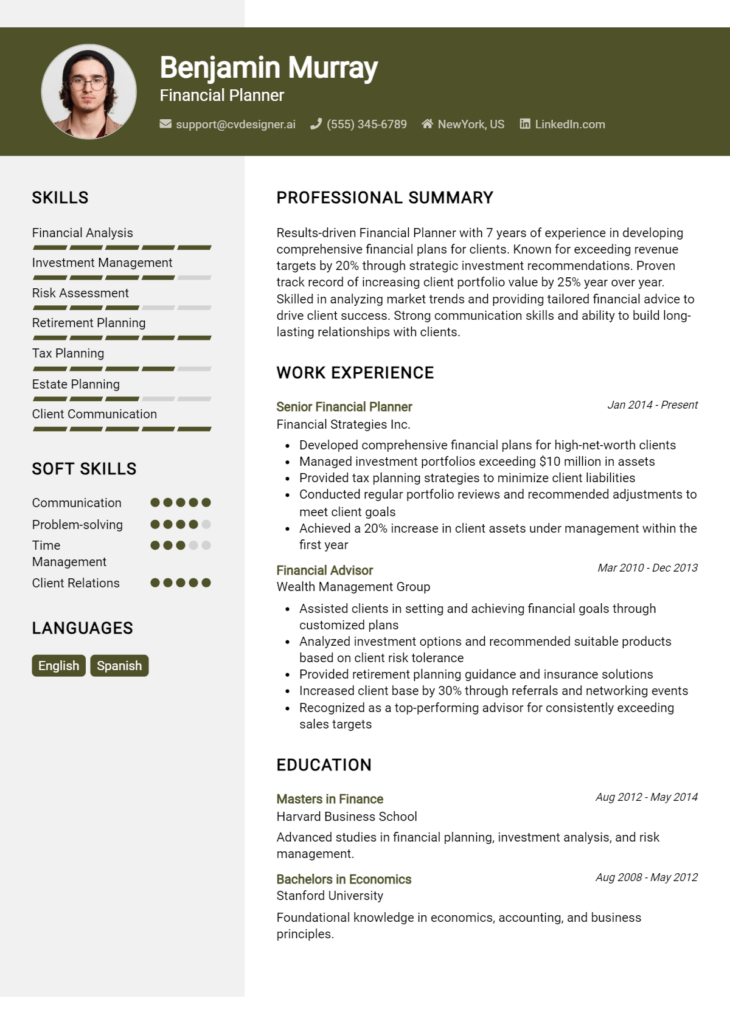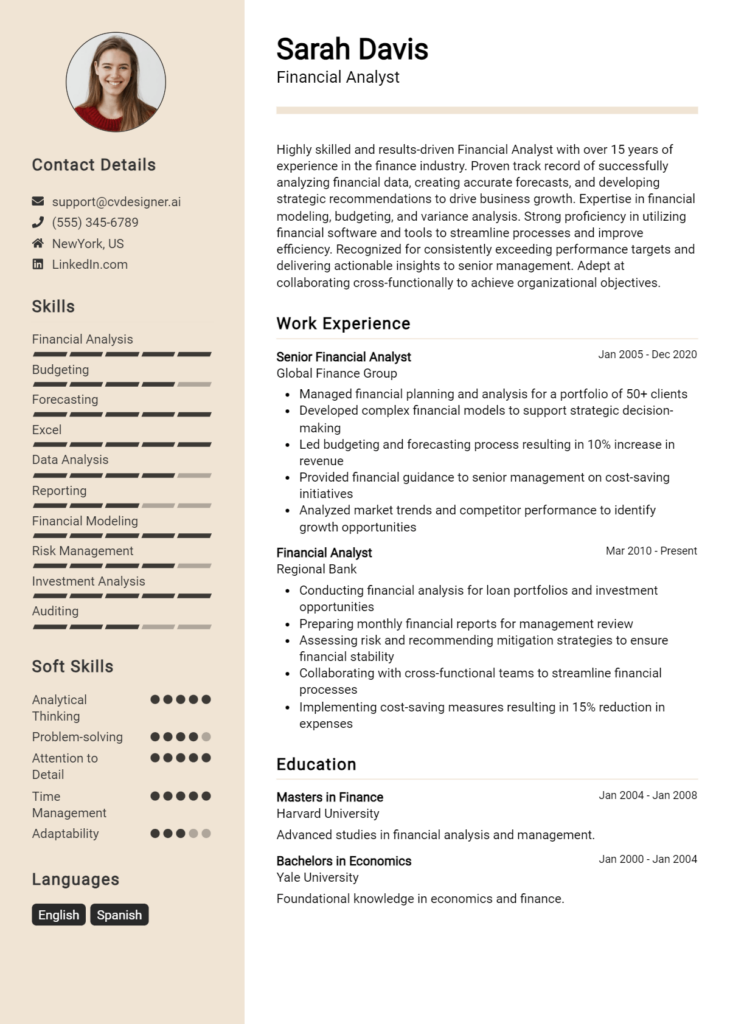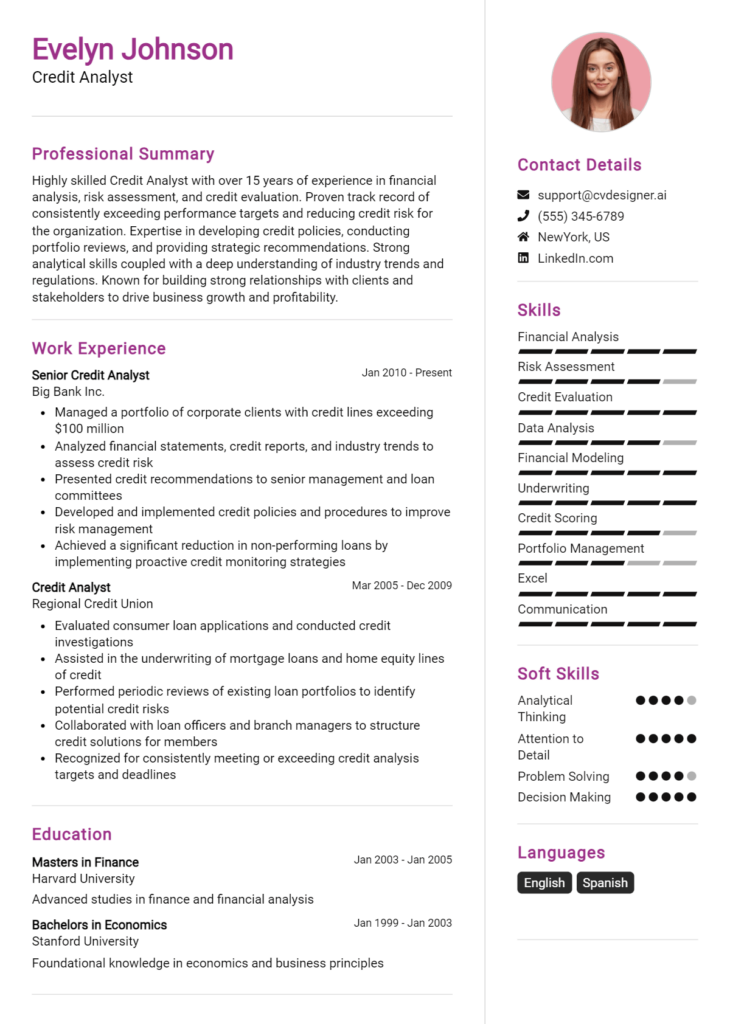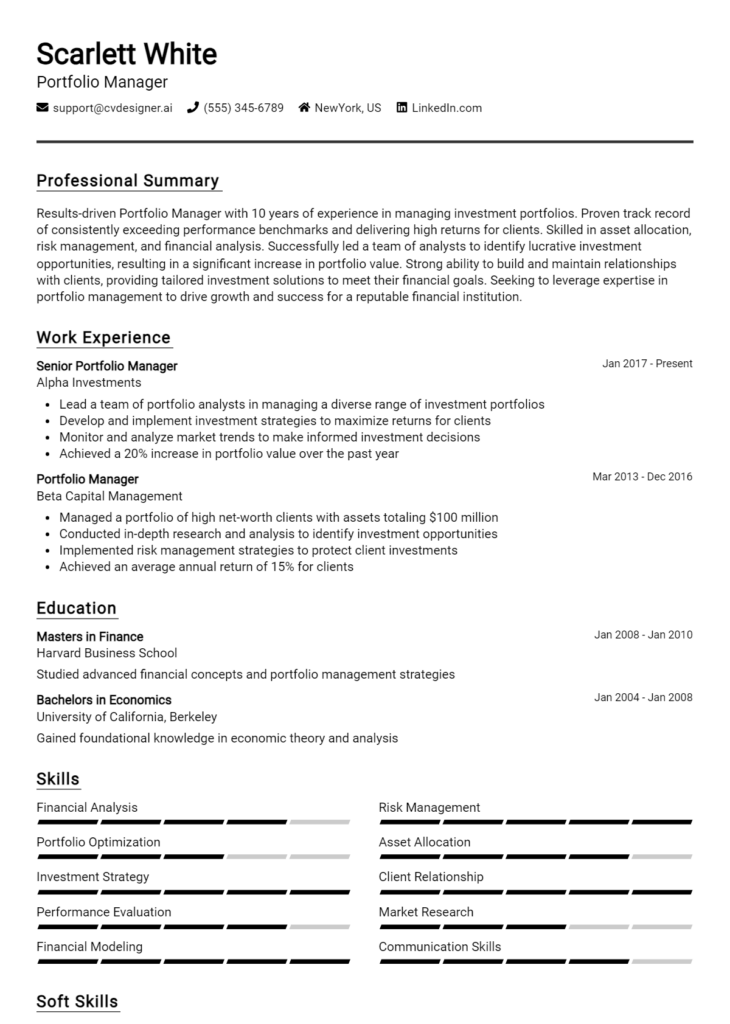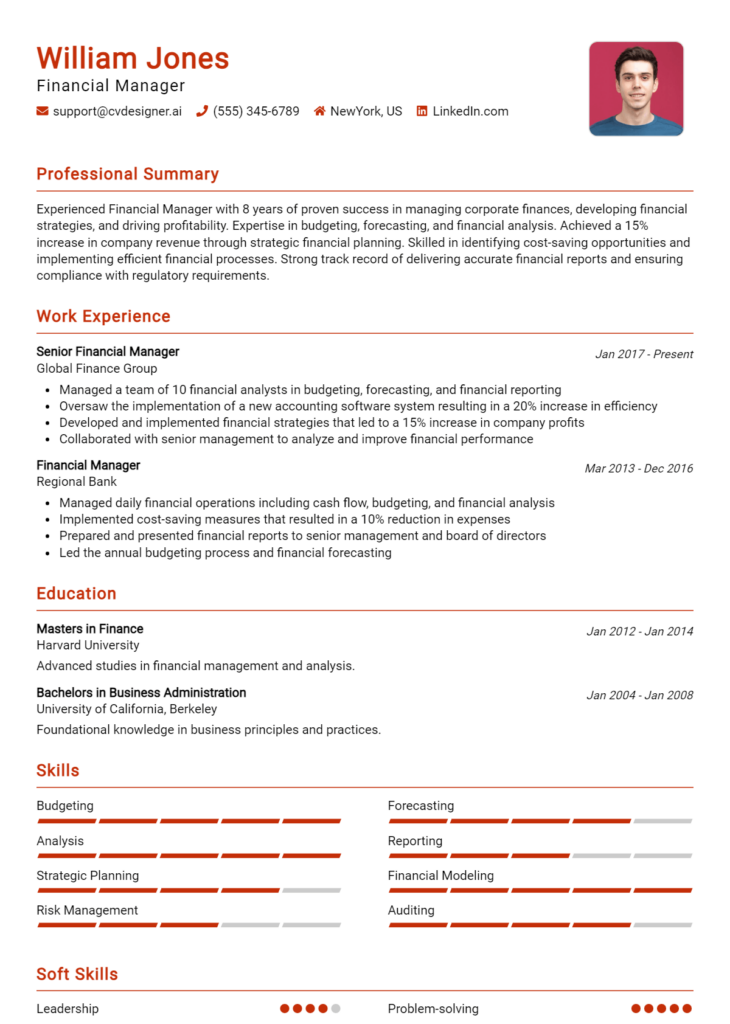Financial Data Scientist Core Responsibilities
A Financial Data Scientist plays a pivotal role in bridging finance, technology, and analytics within an organization. Key responsibilities include analyzing financial data, developing predictive models, and generating actionable insights to drive business strategies. Essential skills encompass strong statistical knowledge, proficiency in data manipulation tools, and problem-solving abilities. These competencies contribute significantly to achieving organizational goals. A well-structured resume effectively highlights these qualifications, making candidates stand out in a competitive job market.
Common Responsibilities Listed on Financial Data Scientist Resume
- Analyze and interpret complex financial datasets to provide insights.
- Develop predictive models to forecast financial trends and risks.
- Collaborate with cross-functional teams to integrate data-driven decisions.
- Utilize statistical methods to optimize financial processes.
- Design and implement data visualization tools for stakeholder communication.
- Conduct market research to inform financial strategy.
- Automate data collection and reporting processes.
- Monitor and evaluate the effectiveness of financial strategies.
- Ensure data integrity and compliance with regulatory standards.
- Present findings and recommendations to senior management.
- Stay updated with industry trends and technological advancements.
High-Level Resume Tips for Financial Data Scientist Professionals
In the competitive landscape of financial data science, a well-crafted resume is not just a formality; it’s a vital tool that can determine your career trajectory. As the first impression you make on potential employers, your resume must succinctly reflect your skills, experiences, and achievements in a manner that resonates with the specific demands of the financial industry. For Financial Data Scientist professionals, the ability to convey technical proficiency alongside business acumen is essential. This guide will provide practical and actionable resume tips tailored specifically for your field, ensuring that your application stands out in a crowded job market.
Top Resume Tips for Financial Data Scientist Professionals
- Tailor your resume to match the job description, emphasizing keywords and skills mentioned by the employer.
- Highlight relevant experience in data analysis, financial modeling, and statistical programming.
- Quantify your achievements with specific metrics, such as percentage improvements in forecasting accuracy or cost reductions.
- Showcase industry-specific skills, including proficiency in tools like Python, R, and SQL, as well as knowledge of financial regulations.
- Include projects or case studies that demonstrate your problem-solving abilities and analytical thinking.
- Utilize a clean and professional format that enhances readability and draws attention to key sections.
- Incorporate soft skills such as communication and teamwork, particularly in the context of cross-functional projects.
- List relevant certifications or training, such as CFA, FRM, or advanced coursework in machine learning and data analytics.
- Keep your resume concise, ideally one page, focusing on the most relevant experiences and skills to the position.
By implementing these tips, you can significantly enhance your chances of landing a job in the Financial Data Scientist field. A well-structured resume that clearly communicates your qualifications and achievements will not only catch the eye of hiring managers but also set the stage for successful interviews, ultimately leading to a promising career in this dynamic industry.
Why Resume Headlines & Titles are Important for Financial Data Scientist
In the competitive landscape of financial data science, the importance of resume headlines and titles cannot be overstated. A well-crafted headline serves as the first impression for hiring managers, capturing their attention and summarizing a candidate's key qualifications in a single impactful phrase. It is essential for these headlines to be concise, relevant, and directly related to the job being applied for, as they can greatly influence the decision-making process in a sea of applicants. A strong headline not only highlights a candidate's strengths but also sets the tone for the rest of the resume, making it crucial for aspiring financial data scientists to invest time in creating an effective one.
Best Practices for Crafting Resume Headlines for Financial Data Scientist
- Keep it concise: Aim for a headline that is brief yet informative, ideally no longer than one sentence.
- Be role-specific: Tailor the headline to reflect the specific position and responsibilities of a Financial Data Scientist.
- Highlight key skills: Incorporate relevant technical and analytical skills that are in demand for the role.
- Showcase experience: If applicable, mention years of experience or notable achievements to add credibility.
- Use industry keywords: Include terminology commonly used in financial data science to align with job descriptions.
- Maintain professionalism: Ensure that the language is formal and free from jargon that may not be understood by all hiring managers.
- Focus on value: Convey how your skills and experiences can add value to the potential employer.
- Test for impact: Consider how the headline sounds and what impression it leaves—make adjustments as necessary.
Example Resume Headlines for Financial Data Scientist
Strong Resume Headlines
"Data-Driven Financial Scientist with 5+ Years of Experience in Predictive Analytics and Risk Management"
“Financial Data Scientist Specializing in Machine Learning Models for Investment Strategies”
“Expert in Big Data Analytics and Financial Modeling with Proven Track Record in Boosting ROI”
Weak Resume Headlines
“Financial Data Scientist Looking for Job”
“Professional with Data Skills”
The strong headlines are effective because they clearly communicate the candidate’s expertise and specific skill set, immediately showcasing their qualifications to potential employers. They highlight relevant experience and use industry-specific terminology that resonates with hiring managers. In contrast, the weak headlines lack specificity and fail to convey any meaningful information about the candidate's capabilities. This vagueness can lead to an immediate dismissal, as hiring managers seek candidates who present themselves confidently and relevantly for the role at hand.
Writing an Exceptional Financial Data Scientist Resume Summary
A resume summary is a critical component for a Financial Data Scientist as it serves as the first impression a hiring manager will have of a candidate. This brief yet impactful section offers a snapshot of key skills, experience, and accomplishments that are pertinent to the role, allowing candidates to quickly capture attention and stand out in a competitive job market. A well-crafted summary should be concise and tailored to the specific job description, effectively highlighting the candidate's strengths and suitability for the position.
Best Practices for Writing a Financial Data Scientist Resume Summary
- Quantify achievements: Use specific metrics to illustrate your contributions and successes.
- Focus on relevant skills: Highlight technical skills such as data analysis, statistical modeling, and programming languages pertinent to finance.
- Tailor the summary: Customize your summary for each job application to align with the requirements outlined in the job description.
- Use strong action verbs: Start sentences with impactful verbs that convey your accomplishments and responsibilities.
- Keep it concise: Aim for 3-5 sentences that encapsulate your experience without overwhelming the reader.
- Showcase industry knowledge: Mention familiarity with financial regulations, market trends, or financial modeling techniques.
- Highlight problem-solving abilities: Emphasize your capacity for identifying issues and devising effective data-driven solutions.
- Include relevant certifications: If applicable, mention any industry-specific certifications that add credibility to your expertise.
Example Financial Data Scientist Resume Summaries
Strong Resume Summaries
Results-driven Financial Data Scientist with over 5 years of experience in leveraging advanced analytics to drive strategic decision-making. Successfully implemented predictive models that increased forecasting accuracy by 30%, resulting in a 15% reduction in operational costs.
Detail-oriented Financial Data Scientist proficient in Python and SQL, with a proven track record of designing data pipelines that enhanced data processing efficiency by 40%. Recognized for developing a risk assessment model that improved loan approval rates by 25% while maintaining compliance with regulatory standards.
Innovative Financial Data Scientist with expertise in machine learning and statistical analysis. Developed a customer segmentation model that boosted targeted marketing efforts and increased customer retention by 20% in one fiscal year.
Weak Resume Summaries
Financial Data Scientist with experience in data analysis. Looking for a challenging role in finance.
Data scientist with a background in finance and analytics. Interested in using skills in a financial company.
The examples of strong resume summaries effectively convey specific achievements, relevant skills, and measurable results, making them impactful and tailored to the Financial Data Scientist role. In contrast, the weak resume summaries lack specificity, quantifiable outcomes, and fail to demonstrate the candidate's unique qualifications, rendering them generic and less compelling to hiring managers.
Work Experience Section for Financial Data Scientist Resume
The work experience section is a critical component of a Financial Data Scientist's resume, serving as a platform to demonstrate the candidate's technical skills, team management capabilities, and the ability to deliver high-quality products. This section not only highlights relevant experiences but also allows candidates to quantify their achievements, illustrating their impact in previous roles. Aligning these experiences with industry standards is essential to capture the attention of potential employers, showcasing how the candidate is equipped to meet the demands of the financial sector.
Best Practices for Financial Data Scientist Work Experience
- Focus on relevant technical skills such as statistical analysis, machine learning, and data visualization tools.
- Quantify achievements with specific metrics (e.g., increased efficiency by 30%, reduced costs by $50,000).
- Highlight experience in managing teams or projects, emphasizing leadership roles and collaborative efforts.
- Use action verbs to convey a sense of proactivity (e.g., developed, implemented, optimized).
- Align experiences with industry standards and best practices in financial data science.
- Include any relevant certifications or training that add credibility to your expertise.
- Tailor the work experience section to match the job description and required skills.
- Showcase successful collaborations with cross-functional teams, emphasizing communication skills.
Example Work Experiences for Financial Data Scientist
Strong Experiences
- Led a team of data scientists in developing a predictive analytics model that improved loan default prediction accuracy by 25%, directly reducing risk exposure by $1M.
- Implemented a real-time data visualization dashboard, enhancing decision-making speed by 40% for the risk management department, resulting in quicker response to market fluctuations.
- Designed and executed a machine learning algorithm that increased investment portfolio returns by 15% over a fiscal year, outperforming market benchmarks.
- Collaborated with IT and finance teams to streamline data processes, reducing data retrieval time by 50%, which enabled timely analysis and reporting.
Weak Experiences
- Worked on financial data analysis with some success.
- Involved in a project that utilized machine learning techniques.
- Participated in team meetings to discuss data-related issues.
- Helped with data collection for various financial reports.
The strong experiences are characterized by specific, quantifiable outcomes that clearly illustrate the candidate's impact and expertise in financial data science. They reflect a proactive approach, showcasing leadership and collaboration in meaningful projects. In contrast, the weak experiences lack detail and measurable results, making it difficult to assess the candidate's true contributions and capabilities. This contrast highlights the importance of clarity and specificity in the work experience section.
Certifications and Education for a Financial Data Scientist Resume
When crafting a resume for a Financial Data Scientist role, it's crucial to highlight certifications and educational qualifications that demonstrate both technical prowess and an understanding of financial principles. Here are some guidelines and examples to help you effectively list your certifications and education.
Certifications to Prioritize
Certified Financial Analyst (CFA): This globally recognized certification focuses on investment management and financial analysis, making it highly relevant for financial data scientists who need to interpret and analyze financial data effectively.
Certified Data Scientist (CDS): Offered by various institutions, this certification covers essential data science skills, including statistical analysis, machine learning, and data visualization, which are crucial for analyzing large datasets.
Financial Risk Manager (FRM): This certification is designed for risk management professionals. It enhances your understanding of risk analysis and management, which is vital when working with financial data.
Microsoft Certified: Azure Data Scientist Associate: With the increasing use of cloud platforms in finance, this certification demonstrates your ability to use Azure tools for data science projects, including machine learning and data analysis.
Relevant Educational Backgrounds
Bachelor’s Degree in Finance or Economics: A solid foundation in finance or economics equips you with the necessary background to understand market behaviors and economic indicators, which are essential for a financial data scientist.
Bachelor’s or Master’s Degree in Data Science or Computer Science: Degrees in these fields provide vital programming and statistical skills, allowing you to manage and analyze complex datasets effectively.
Master’s in Financial Engineering: This interdisciplinary degree combines finance, mathematics, and computer science, making it particularly relevant for roles that require quantitative analysis of financial data.
Master’s in Statistics or Applied Mathematics: A strong background in statistics or mathematics is crucial for conducting advanced analyses and developing predictive models in finance.
By emphasizing these certifications and educational backgrounds in your resume, you can effectively showcase your qualifications and readiness for a Financial Data Scientist role.
Top Skills & Keywords for Financial Data Scientist Resume
In the competitive field of financial data science, showcasing the right skills on your resume is crucial for standing out to potential employers. As a Financial Data Scientist, you are required to blend quantitative analysis with financial acumen, making it imperative to highlight both hard and soft skills that demonstrate your expertise. Employers look for candidates who not only possess technical proficiency but also excel in communication, problem-solving, and teamwork. A well-crafted resume that effectively incorporates these skills can significantly enhance your chances of landing an interview.
Top Hard & Soft Skills for Financial Data Scientist
Soft Skills
- Analytical Thinking
- Problem-Solving
- Communication Skills
- Team Collaboration
- Adaptability
- Attention to Detail
- Time Management
- Critical Thinking
- Creativity
- Interpersonal Skills
Hard Skills
- Statistical Analysis
- Machine Learning Algorithms
- Data Visualization Tools (e.g., Tableau, Power BI)
- Programming Languages (e.g., Python, R)
- Financial Modeling
- Database Management (e.g., SQL)
- Predictive Analytics
- Risk Assessment Techniques
- Knowledge of Financial Markets
- Proficiency in Excel and Advanced Spreadsheet Functions
Incorporating the right skills into your resume, along with relevant work experience, is essential to convey your qualifications effectively.
Stand Out with a Winning Financial Data Scientist Cover Letter
I am excited to apply for the Financial Data Scientist position at [Company Name], as advertised on [Job Board/Company Website]. With a robust background in finance and data analytics, coupled with hands-on experience in machine learning and statistical modeling, I am confident in my ability to contribute effectively to your team and drive data-informed decision-making within your organization. My passion for leveraging data to uncover insights and optimize financial strategies aligns perfectly with the innovative goals of [Company Name].
In my previous role at [Previous Company Name], I successfully developed predictive models that analyzed market trends and consumer behavior, leading to a 20% increase in revenue through targeted investment strategies. I utilized advanced statistical techniques and programming languages such as Python and R to process large datasets, extracting actionable insights that informed executive-level decisions. My ability to communicate complex data findings in a clear and concise manner has allowed me to collaborate effectively with cross-functional teams, ensuring alignment on key financial initiatives.
I am particularly drawn to [Company Name] because of its commitment to leveraging cutting-edge technology in financial services. I am eager to bring my expertise in data visualization and machine learning algorithms to enhance your analytical capabilities and support the development of innovative financial products. I am confident that my proactive approach to problem-solving, combined with my technical acumen and financial knowledge, will make a meaningful impact on your team.
Thank you for considering my application. I look forward to the opportunity to discuss how my skills and experiences align with the needs of [Company Name]. I am enthusiastic about the chance to contribute to your esteemed organization and help drive its success through data-driven financial strategies.
Common Mistakes to Avoid in a Financial Data Scientist Resume
Crafting an effective resume as a Financial Data Scientist requires careful attention to detail, as it's a competitive field that demands both technical and analytical skills. However, many applicants make common mistakes that can undermine their chances of landing an interview. Avoiding these pitfalls can significantly enhance your resume's impact, ensuring that your qualifications and experience stand out to potential employers. Here are some frequent errors to steer clear of:
Vague Job Descriptions: Failing to provide specific details about your previous roles can leave hiring managers unsure of your capabilities. Clearly outline your responsibilities and accomplishments in past positions.
Overloading with Technical Jargon: While technical skills are crucial for a Financial Data Scientist, using excessive jargon can alienate readers. Strive for clarity and balance between technical language and accessible explanations.
Ignoring Quantifiable Achievements: Resumes that lack quantifiable results miss an opportunity to showcase your impact. Use metrics to illustrate your contributions, such as improvements in efficiency, cost savings, or revenue growth.
Neglecting Soft Skills: Focusing solely on technical skills can be a mistake, as soft skills like communication and teamwork are equally important. Highlight how you've effectively collaborated with cross-functional teams or communicated complex data insights.
A Generic Resume: Sending a one-size-fits-all resume can be detrimental. Tailor your resume to each job application by emphasizing relevant skills and experiences that align with the specific job requirements.
Lacking a Clear Structure: A cluttered or poorly organized resume can frustrate hiring managers. Use clear headings, bullet points, and consistent formatting to enhance readability and make your resume visually appealing.
Not Including Relevant Certifications: Financial Data Scientists often benefit from certifications in data analysis, machine learning, or finance. Omitting these can make your resume less competitive, so ensure you include any relevant credentials.
Failing to Update Your Resume: An outdated resume can reflect poorly on your professionalism. Regularly update it to include new skills, experiences, and achievements, ensuring it accurately represents your current capabilities.
Conclusion
As a Financial Data Scientist, you play a pivotal role in merging finance with data analytics to derive actionable insights for decision-making. Throughout this article, we have explored various aspects of the Financial Data Scientist role, including key responsibilities such as data analysis, model development, and financial forecasting. We also discussed the essential skills required for success in this position, such as proficiency in programming languages, experience with statistical methods, and a strong understanding of financial concepts.
Additionally, we highlighted the importance of effective communication skills, as you will often need to present complex data findings to stakeholders in a clear and concise manner. Networking within the finance and data science communities was also emphasized as a way to stay updated on industry trends and opportunities.
Now, as you reflect on your qualifications and experiences, it's crucial to ensure that your resume accurately showcases your skills and accomplishments in this competitive field. We encourage you to take the time to review and enhance your Financial Data Scientist resume. Utilize available resources such as resume templates, a comprehensive resume builder, and tailored cover letter templates to create a standout application. Make the most of these tools to present yourself as the ideal candidate for your next career opportunity!

